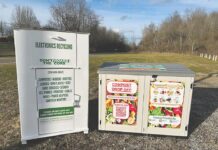Editor:
I would like to point out several inaccuracies and distortions in the recent press release from the Infectious Diseases Society of America that was reported in last week’s issue of Farm and Dairy.
To support its claim that unpasteurized milk “poses serious health risks without benefits,” the Infectious Diseases Society reported the average rate of outbreaks linked to raw milk has doubled to an average of just over five a year.
First of all, five unspecified “outbreaks” is a ridiculously small number considering the total population of the U.S., and what is left unstated in the report is the majority of these outbreaks are due to so-called “bathtub” home soft cheese production and not due to fluid milk.
According to data available from the Center for Disease Control, outbreaks of salmonellosis, campylobacteriosis and E. coli are much more prevalent from common foods such as lettuce, ground beef, sausage, chicken, oysters, etc. than from unpasteurized milk.
The Infectious Diseases Society also states there is no scientific evidence to support the claim unpasteurized milk cures or prevents diseases, which is demonstrably false.
In 2006 the European PARSIFAL group published the results of their five-year study of 15,000 school-age children in five European counties and concluded there is an “inverse association of farm milk consumption with asthma and allergy in rural and suburban populations across Europe.”
Part of the confusion results from different meanings of the term “raw milk.”
Government agencies and the medical community say “raw milk” and mean milk from typical grain-based dairy farms and CAFOs that is intended for final pasteurization and retail distribution.
People in the local food community say “raw milk” and mean fluid milk from small family farms that strictly employ grass-based feeding, good pasture management and produce milk intended for human consumption.
People in the local food community would entirely agree raw milk from the former is indeed a probable disease vector, and there is scientific evidence in support of the health benefits of raw milk from the latter.
Government agencies and the medical community taint all types of raw milk with the same brush and deny there is any difference between them.
Finally, the press release also decries the use of “cow-share” programs as a means to circumvent state laws against raw milk sales.
I would like to point out Judge Hein’s December 2006 court decision in favor of Paul Schmitmeyer‘s suit against the Ohio Department of Agriculture demonstrated the fact there is nothing illegal about herdshare contracts that comport with Ohio law.
I have been a herd shareholder in an Ohio dairy farm for almost four years, and hundreds of other shareholders and their families daily drink milk, cream and butter from the cows on our farm we collectively own.
I have a very close personal and financial relationship with my farmer. I’ve helped out on the farm and my 5-year-old son has a great time whenever we go there.
We live in the city, and I’m very grateful my son has the opportunity to also experience rural life and to have a strong connection with the source of our food.
Raw milk is sold retail in some states such as California, and is available through vending machines in some European countries.
However, I’d be personally reluctant to drink milk from an unknown farm, and I much prefer the advantages of having a herdshare boarding contract with a single farm.
Don Neeper
Rocky River, Ohio












